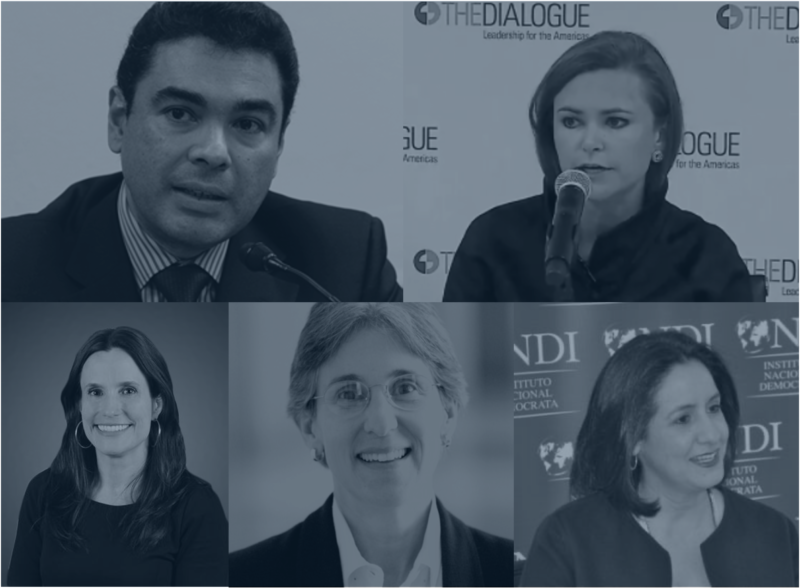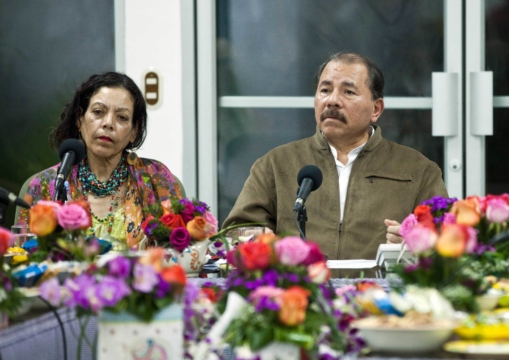A Fatal Blow to Democracy
Nicaragua is on the precipice.
On May 9, 2022, the Inter-American Dialogue hosted a public event to discuss the current democratic erosion in Nicaragua and the ways the international community should react to increasing impunity by the Ortega-Murillo regime. A panel of distinguished experts was invited to discuss the topic, including: Deborah Ullmer, regional director of the Latin America and the Caribbean Program at the National Democratic Institute, Emily Mendrala, Deputy Assistant Secretary, Bureau of Western Hemisphere Affairs of the US Department of State, Cynthia J. Arnson, distinguished fellow at the Woodrow Wilson Center, and Manuel Orozco, director of the Migration, Remittances, and Development Program at the Inter-American Dialogue. The exchange was moderated by Rebecca Bill Chavez, president and CEO of the Inter-American Dialogue.
Chavez gave welcoming remarks and introduced the topic by referencing the systematic dismantling of democratic institutions in Nicaragua. She placed responsibility for this on the Ortega-Murillo government, which is criminalizing opposition parties and abolishing the independent press, among other transgressions. The president of the Dialogue then raised the recent publication of a report titled “A Push for Freedom: Ensuring a Democratic Transition in Nicaragua through International Pressure” by Manuel Orozco and initiated the conversation.
Orozco started his remarks by pointing out three facts about the situation. First, he underlined the obsession that Daniel Ortega and Rosario Murillo have with power, so extreme that it has turned Nicaragua into a rogue state, which no longer respects international law. The second issue raised by Orozco is the enjoyment of impunity by the Nicaraguan regime, which has become increasingly recognized as a dictatorship in the international arena. Thirdly, Orozco posited that a proportionate response to the use of impunity can no longer be addressed solely with economic sanctions.
According to Orozco, the international community should make it clear that it’s not ready to tolerate extortion in exchange for concessions and that it should adopt a tougher stance on Nicaragua. There are different tools to apply pressure that could be enlisted, which range from soft power measures such as the continued condemnation of the regime and the request for the release of political prisoners to international isolation and the suspension of Nicaragua from the institutions of the Inter-American system.
“Rather than dealing with how the Ortega regime wants to negotiate its power position in exchange for the release of political prisoners, it is instead important to change the balance of power in the relation by applying more international pressure.”
The conversation continued with the intervention of Ullmer, who detailed some of the steps Nicaragua took on the path towards becoming a dictatorship. Elections in 2021 represented only a culmination of the regime’s long assault on democracy, during which seven political opponents were jailed and citizens were repressed through the use of the military and police forces. Moreover, a corrupt judiciary fabricated false evidence against the regime’s opponents and denied them basic legal rights. The government has also recently seized private universities, shut down NGOs and formally exited the Organization of American States (OAS).
“Democratic erosion doesn’t happen overnight or without warning. Political space in the country started closing not in 2018 but in 2008, with municipal elections described as the most documented fraud of Nicaragua’s history.”
Ullmer coincided with Orozco’s point about the need to scale up international pressure against Nicaragua and then added that the approaching Summit of the Americas could provide the necessary forum to discuss a united reaction and reaffirm the region's shared values of transparency and accountability. To deal with authoritarianism, the United States should use all its tools, starting with the Renacer Act and including anti-corruption measures such as the Corporate Transparency Act and the Global Magnitsky Act. Finally, her remarks ended with the acknowledgment of the importance of the recent nomination of US ambassadors to Nicaragua and to the OAS.
Mendrala then took the floor and delved into the details of the recently approved Renacer Act and its significance for Nicaragua. It expanded the list of corrupt and undemocratic actors to include the Nicaraguan regime and the US administration was able to cooperate with Canada and the European Union to impose sanctions on more than forty-six individuals and nine entities. Mendrala also listed other actions taken to put pressure on the Ortega regime, such as visa restrictions on individuals and strong multilateral actions through the UN and OAS, where resolutions were passed to condemn Nicaragua, a signatory of the Inter-American Democratic Charter.
“We call on the Ortega-Murillo regime to immediately release those unjustly imprisoned for speaking out against abuses. The United States remains as committed as ever to the restoration of democracy in Nicaragua and the international community has joined our efforts.”
Arnson echoed some takeaways from Orozco’s previous report on Nicaraguan migrants, starting with the fact that Nicaragua should not be treated as a standalone issue by the United States but should instead be integrated into the Root Causes Strategy of the administration. A second point she raised from the report was that some fundamental US interests are indeed at stake in Nicaragua, such as the commitment to democracy and human rights and the deepening involvement of external actors such as Russia, China, and also Iran.
The panel then turned to a constructive debate on the efficacy of sanctions, once Arnson put forward her disagreement with the strategy to increase international pressure on Nicaragua, given how the recent “maximum pressure” policy in Venezuela of the Trump administration has not reached the goals it was set to achieve. As an alternative, the United States should instead try to identify elements that the Ortega regime is seeking and that can be traded in exchange for objectives pursued by the US administration, like the release of political prisoners. To conclude, she added that a trade-off between justice and impunity is needed in delicate situations like Nicaragua.
“Excessive sanctions do not generate changes in behavior but only accelerate the dependence of the targeted country on external actors such as China, Russia, and Iran, who provide economic lifelines to the regime.”
The productive exchange on sanctions continued even during the question and answer section, where Orozco reiterated his opinion concerning the need to scale up international pressure, considering that the main concern of the Ortega-Murillo regime is to actually be recognized as a dictatorship. Finally, Chavez continued moderating the session by posing questions to the speakers, which concerned the implementation of the Renacer Act, the role of China and Russia in the country, and the possibility of an embargo on Nicaragua.
Nicaragua is on the precipice.
What will Ortega’s landslide victory allow him to do in his next term?
Strongman Daniel Ortega is running for a third term (with his wife as VP) and cravenly removing all checks on his power. Sound familiar?
 Panelists for the discussion on Nicaragua
Panelists for the discussion on Nicaragua
